EnviroThursday Spring 2023
Contact
Environmental StudiesOlin-Rice Science Center, Room 249 651-696-6274
esson@macalester.edu
instagram twitter
Presentations take place at 12 noon, Olin-Rice Room 250
February 2, 2023
EnviroThursday – Space Place and Humanities Seminar Series
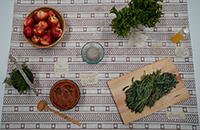
“Sweat Together: Public Pleasure”
Speaker: Stephanie Lindquist, Artist-in-Residence, Media and Cultural Studies, Macalester
Join in conversation about the relationship between sustainability and pleasure as artist Stephanie Lindquist reflects over her last six months learning about water and care. Rooted in working with plants and soil in the garden, kitchen, and studio, she began an experimental sauna series last fall for activists, teachers, and students, which is coming to Macalester this semester. Together let’s consider the relationship between beauty and justice, as Stephanie explores the emotional, social, spiritual, and practical importance of sweating together.
Stephanie Lindquist is a visual artist and cultural producer from Los Angeles. She is presently an Artist-in-Residence at Macalester College working with activists, artists, humanities professors, and scientists around the Mississippi River. Her work is rooted in experimentation and informed by plants, history, and materiality. Lindquist received her BA in Visual Studies and Urban Studies from Columbia University in 2009 and MFA in Interdisciplinary Art and Social Practice from the University of Minnesota in 2022. Her work has been exhibited at Franconia Sculpture Park, NXTHVN, Google, SooVAC, Smack Mellon, the New York Public Library, the Allen Hospital, The New Museum, The Bronx Museum of the Arts, El Museo del Barrio, SPRING/BREAK Art Show, the Elizabeth Foundation for the Arts, and Memorial Union Gallery at North Dakota State University among others.
February 9, 2023
No EnviroThursday – ES Majors and Minors Lunch
February 16, 2023
No EnviroThursday
February 23, 2023
No EnviroThursday
March 2, 2023
EnviroThursday – Space Place and Humanities Seminar Series
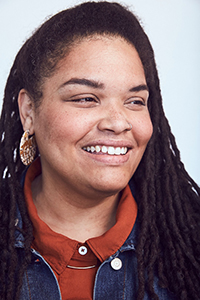
“In Search of a Darker Wilderness”
Speaker: Erin Sharkey, Cultural Producer, Writer, Arts and Abolition Organizer, and Cultural Worker based in Minneapolis on Dakota land.
What are the politics of nature? Who owns it, where is it, what role does it play in our lives? Does it need to be tamed? Are we ourselves natural? Erin Sharkey will discuss, A Darker Wilderness, a collection of personal and lyric essays in conversation with archival objects of Black history. Each of these essays explores stories spanning hundreds of years and thousands of miles, traveling from roots to space–finding rich Blackness everywhere. Writers consider the significance of nature in their lives and on the role of nature in the lives of Black folks.
Erin Sharkey is the co-founder, with Junauda Petrus, of an experimental production collective called Free Black Dirt and a steward of The Fields at Rootsprings, a retreat and respite place centering BIPOC and LGBTQ+ folks in central MN. She is the editor of A Darker Wilderness: Black Nature Writing from Soil to Stars, an essay collection from Milkweed Editions (Feb 2023). Erin was recently awarded the Ashé Lab Fellowship from Penumbra Theatre, and the Black Seed Fellowship from Black Visions and the Headwaters Foundation. Currently, she teaches with Minnesota Prison Writers Workshop.
March 9, 2023
Location: JBD Lecture Hall, Campus Center
“What Worlds Will We Create? Orienting Our Scientific Praxis Toward Liberation”
Speaker: Jennifer Nicklay, PhD student in Land and Atmospheric Science, University of Minnesota
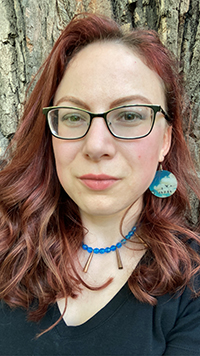
In this seminar, Jennifer Nicklay (she/her/hers) will invite attendees to engage with the tensions, the disruptions, and the joys that emerge when we orient our science towards imagining and creating more just and sustainable worlds. Jennifer is an urban gardener, community organizer, and interdisciplinary scholar. Across these roles, and inspired by abolition and anti-colonization movements, Jennifer is committed to work that builds ways of being in relationship, with both land and people, that affirms life and freedom. Yet, within her education in biology and agricultural/soil science, Jennifer often encountered norms, assumptions, and methods that perpetuated unjust relationships. Throughout her graduate program, Jennifer has focused on creating and cultivating a scientific praxis that aligns with her commitments by integrating healing, accountability, and collective learning into her community-based participatory research with urban farmers and gardeners in Minneapolis / St. Paul, MN.
Co-sponsored by the Environmental Studies and Biology Departments.
March 16, 2023
No EnviroThursday – Spring Break
March 23, 2023
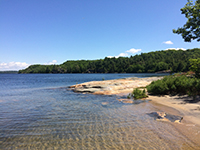
“Climate Change and its Impacts on Indigenous Peoples of North America and Africa”
Speakers: Samuel Akinbo and Mskwaankwad Rice, University of Minnesota
This presentation will examine the effects of climate change upon Indigenous peoples, their cultures and especially their languages, taking case studies from Africa and North America. Colonization, urban-rural migration, war and conflicts are some of the factors that contribute to the endangerment of language and culture, and climate change is entangled within these. Considering that the existence of Indigenous peoples is intricately linked to the well-being and survival of the biodiversity and natural resources surrounding them, global climate changes pose a great threat to the vitality of Indigenous cultures, traditions and languages. The implications of these issues for research communities, indigenous people and climate emergency organizations will also be discussed.
Samuel Akinbo is a community-based researcher with interests in phonological description, analysis and theory, syntax-phonology interface and phonetics. He has deep experience doing community-based research on endangered and under-resourced African languages. His approach to linguistic research involves considering language-external evidence for linguistic theory, so his research also focuses on language-music connections (e.g., talking drums) and language-based cultural aesthetics. Mskwaankwad Rice is currently a PhD student of Linguistics at the University of Minnesota. As an L2 learner of his heritage language, he is interested in all things Ojibwe (endonymically known as Nishnaabemwin in his home dialect) and it is his work in language reclamation that has led him to study linguistics formally.
Co-sponsored by the Environmental Studies and Linguistics Departments.
March 30, 2023
EnviroThursday – Space Place and Humanities Seminar Series

“Passage”
Speaker: Regina Agu, Artist
Regina Agu’s seminar will discuss the history of the panorama as a visual form, with a focus on depictions of the Gulf South and Mississippi River as panoramic spaces. The artist’s work, Passage, will serve as an entry point to examining the precarious environmental, social, and political geographies of the Gulf South through visual representation, socially-engaged research, and mining the intertwined historical legacies that shape the contemporary landscapes and waterways of the region.
Regina Agu was born in Houston, TX and raised between the United States, Republic of the Congo, Nigeria, South Africa, and Switzerland. She relocated to Chicago at the beginning of 2020, where she now lives and works. Her work has been included in exhibitions, public readings, publications, and performances internationally. Agu was a 2022 Radicle artist-in-residence in the Jackman Goldwasser Residency at Hyde Park Art Center. Her first solo museum show, Passage, was presented at the New Orleans Museum of Art (2019-2020). Her work has been supported by an Artadia Houston award, grants from Houston Arts Alliance, The Idea Fund, and the Kathrine G. McGovern College of the Arts + Project Row Houses fellowship at the University of Houston for her research project A Psychogeography of Emancipation Park. She has attended residencies at the Joan Mitchell Center in New Orleans through a partnership with For Freedoms, A Studio in the Woods, Open Sessions at The Drawing Center in NYC, Atlantic Center for the Arts, Lawndale Artist Studio Program, among others. From 2014-2017, Agu was the co-director of Alabama Song, a collaboratively-run art space in Third Ward, Houston, which received a 2016 SEED grant from The Robert Rauschenberg Foundation. Agu is the founder of the Houston-based WOC Reading Group, and her other collaborative projects include Friends of Angela Davis Park. Agu holds a BS from Cornell University and an MFA from the School of the Art Institute of Chicago.
April 6, 2023
EnviroThursday – Space Place and Humanities Seminar Series
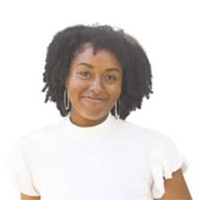
“Openlands: African American Heritage Water Trails Project”
Speaker: Lillian Holden, Education and Outreach Coordinator at Openlands
Paddling, canoeing, hiking, fishing, and birding – Chicago’s Calumet Region has it all. Learn about how Openlands, a regional non-profit, supports communities adjacent to the Little Calumet River in regional eco-tourism, land acquisition, economic empowerment, and heritage. This interactive session will harmonize multiple teaching techniques to optimize learning.
Lillian Holden works with volunteers, teachers, and staff to build and inspire advocates for nature. Lillian believes that a positive introduction to nature at an early age can change the trajectory of the world’s current climate crisis and inspire careers in science. She also believes that exploring the environment in a child’s neighborhood can cultivate a life-long appreciation for nature and can rebuild communities. Bird watching in one’s neighborhood, planting native plants, and growing fresh collards, bell peppers, and basil in the schoolyard can create an awareness that nature lives not only at the park and farm but can be found and created in your front yard and backyard. After completing her 10-month Ameri-Corp apprenticeship with Openlands as a Public Ally, Lillian worked for The Student Conservation Association (SCA) as a program assistant/nature guide for Chicago Park District’s summer campers and had the privilege to teach hands-on environmental education to grades 3rd – 8th in parks such as Montrose Beach, Gompers Park, The South Shore Cultural Center, and Big Marsh. Now a full-time Openlander, Lillian is excited to use the skills gained during the time of her Ameri-Corp apprenticeship and occupancy as the program assistant with The SCA. Lillian is CPR trained, restorative justice trained, and trauma-informed certified. She is also a certified Openlands TreeKeeper. Lillian holds an Associates Degree in Arts from the City Colleges of Chicago.
April 13, 2023
Environmental Studies Honors Presentations
“How Do Highways Affect Racial Disparities in Air Quality”
by Valeska Fresquet Kohan ’23
What is the additional pollution that someone is exposed to by living close to a highway? Are there stronger or weaker effects in areas with minority communities? Inspired by the history of the Rondo neighborhood in the Twin Cities, this study attempts to measure the varied impacts of highways on air quality. While there is extensive literature on the disparate exposures to pollutants such as PM2.5 and NO2, no empirical study has estimated the impact of freeways on air pollution as well as their differential effect on minority areas close to interstates. Knowing the extent to which highways exacerbate pollution inequalities is essential to inform policies that reduce vehicle-emitted pollutants, which may also reduce environmental justice disparities. This paper uses spatially-specific satellite estimates at the km^2 level from 2015-2020 and Census demographic data to test whether policies that reduce highway emissions would disproportionately benefit minority communities. Using a difference-in-differences specification with time and tract fixed effects, I find that living close to an interstate increases exposure to NO2 by 6.1% and PM2.5 by 1.5% on average. In addition, relative to White areas close to interstates, minority areas experienced less relief from pollution during the pandemic. Specifically, Census tracts with less than 50% non-Hispanic Whites had 6.4% higher NO2 pollution than White-majority populations after March 2020.
“Examining the Role of Place Attachment in Climate Justice Engagement and Jewish Relationships to the Environment”
by Madeline Medina ’23
It is critical that environmental justice and marginalized identities are the focus of climate-related discussions and research. Solutions must support the long-term wellbeing of people, especially and importantly those who are most vulnerable to the consequences of climate change. Psychological research suggests that place attachment–the meaningful bonds that occur between people and their environment (Scannell & Gifford, 2010)–is a key factor in motivating environmental behavior, but little research has examined its connection to environmental justice-oriented behavior. This two-part exploration first evaluated the role of place attachment on engagement with both a typical climate change centered message and a climate justice message (Study 1), and found that there was no effect of message condition on engagement with climate issues. Study 2 used a grounded theory approach to explore identity-specific place attachment bonds, and investigated Jewish relationships to place to develop an understanding of Judaism-based environmental justice engagement. Study 2 generated a set of recommendations for future Jewish community action as the effects of climate change become more observable.
April 20, 2023
EnviroThursday – Space Place and Humanities Seminar Series
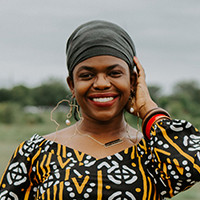
“Spirituality and Ecology: (Re)Membering Black Women’s Legacies”
Speaker: Ebony Aya, Program Manager for the Jan Serie Center for Scholarship and Teaching, Macalester College
This talk will focus on (re)membering and ecology for Black women and what that has looked like in terms of our spiritual and cultural practices historically. The talk will explore what has happened to make us forget these spiritual and cultural practices of being connected to the earth, through brutalization, forced labor, and forced disconnection and discuss ways that Black women have helped us (re)claim what is lost.
Ebony Aya is a doctoral student at the University of Minnesota in Curriculum and Instruction, with minors in Culture and Teaching and African American and African Studies. Additionally, she is the founder of the Aya Collective, a space that centers the expertise and experience of Black women in writing and is the author of published books, The Gospel According to a Black Woman and Incomplete Stories: On Loss, Love, and Hope, and recently launched the Aya Collective’s first anthology, Let the Black Women Say Ase’. All books can be purchased at ayamediapublishingllc.com.